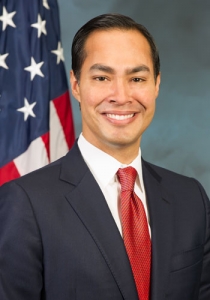
DENVER – Today, 7.7 million American families pay 50 percent or more of their income for rent, or are living in poverty – or both. And, nowhere in the United States can anyone who is making a minimum wage salary afford a two-bedroom apartment. In fact, they can’t even afford a one-bedroom apartment.
“You get a sense of the gravity of the challenges out there,” said fellow Texan and U.S. Department of Housing and Urban Development (HUD) Secretary Julian Castro (pictured) at the CGI America 2015 event being held in Denver this week.
I’ve joined Secretary Castro and many others at this year’s CGI event in Denver and am participating in a working group, “Infrastructure for Cities and States” that includes state and local government officials, business executives, construction and finance representatives and union leaders.
Castro was among a group of panelists addressing “The Map of Making it in America,” a discussion of how, in spite of 66 consecutive months of national growth, decreasing unemployment and continued economic expansion, there are still segments of our communities – many of them lower-income and middle-class Americans – who are not sharing that growth.
Affordable housing is a key element the nation must address, according to the Secretary, to take care of the needs of these classes so they can become educated, working members of our society and be contributors to their own success and that of the nation. To do that, said Castro, will require business leaders to partner with government, civic and community leaders to ensure that all segments of the community reach their potential.
“We still have tremendous challenges,” said Castro of the nation’s housing situation. He said HUD officials want to be a part of that recovery by addressing the affordable housing component “so more people can live in a decent, safe place.” The solution could well be in HUD’s “Choice Neighborhoods” program that includes schools, access to transportation, good jobs and access to workforce training.
Castro said that while he was mayor of the City of San Antonio, local leaders organized across those silos. He said some of the people at the table included representatives of transit, utilities, higher education, housing authorities and other segments of the community. “We need to think holistically about improving those communities,” he said.
When asked by Clinton Foundation Vice Chair Chelsea Clinton how anyone will know when it works, Castro said that in the past, success was generally measured by “does the family have a roof over their heads?” The push now, said the HUD Secretary, is to improve measuring outcomes by the number of kids that do well on reading and math exams, the number that go to college, the number that graduate from college and those that get adequate job training to “go up a notch” in terms of their employment position. “We’re putting infrastructure in place to measure those outcomes,” he said. That will show how the investment has worked, and it’s much easier to attract private and nonprofit partners when you can show success.
Other issues discussed by the panel were related to employment opportunities and fair wages, specifically among agriculture workers, the importance of creating a great workplace that will in turn create great employees and how to meet education challenges such as being able to provide books for children in need.
Kyle Zimmer, chief executive officer of First Book, a nonprofit organization with a mission to provide disadvantaged children with needed books, described two initiatives that are aimed at providing new books at low prices. The initiatives include the National Book Bank that engages book publishers to make available to children in need books that do not sell at retail and are returned to the publisher. She also outlined the First Book Marketplace, an online nonprofit with 6,000 titles of new, not excess, books. Zimmer said that initiative has 180,000 programs that are members. These books generally can be purchased (including shipping costs) for approximately $2.85 per book.
These are just some of the initiatives that already are in place. More are being sought as efforts are made to level the playing field for all Americans.
I will be participating again this afternoon and tomorrow in the infrastructure working group as we address the struggles local and state governments are facing in dealing with declining funds and increasing infrastructure needs. Among the topics are innovations for project selection and finance options such as public-private partnerships, infrastructure banks, bonding and more.
Follow me on Twitter for more updates on CGI America 2015!

